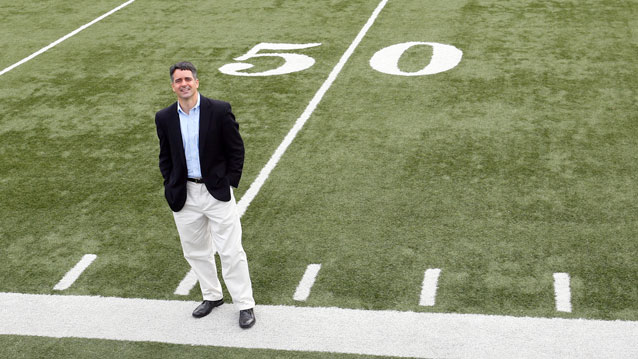In college sports, the walk-on is the ultimate underdog: a student-athlete without a scholarship. Facing far greater odds than any recruited scholarship player, the walk-on has the steepest climb to crack the roster -- let alone the starting lineup.
So what can we learn from the long shot? Quite a bit, according to Paul Corona, who has written about unheralded college football walk-ons who managed to play for some of the game’s legendary champions in the 1970s and ’80s before going on to later success in business and life.
“There is real value in pushing ourselves when the odds are against us,” Corona said. “We can succeed in life by playing it safe, but these people teach us that in order to really grow, we need to get out of our comfort zones.”
As director of learning and organization development in Northwestern University’s Office of Human Resources, Corona knows what he’s talking about. He and his team help staff and faculty excel in their work through training, education, coaching and consulting.
In his book, “The Wisdom of Walk-Ons,” he traces the paths of three individuals from their playing days at Alabama, Notre Dame and Southern California to their experiences as working adults. The book’s takeaway is a list of the seven “winning strategies” they used in college, business and life.
Name one of the strategies and how it applies to work life at Northwestern.
Let’s take “leverage your strengths.” Most people are at their best when building on strengths, not correcting weaknesses. True strengths are what you do extremely well and find fulfilling. If you don't know your strengths, talk with your manager or ask colleagues for a candid assessment. Whether you’re looking at your current role or a new job in a different area of the University, you can make your career come alive by playing up these strengths. And, by the way, that’s what makes great teams: people with complementary strengths working toward common goals.
What will we learn about the walk-ons in the book?
Alan Pizzitola from Alabama, Bob Bleyer from Notre Dame and Gordon Adams from Southern California are regular people. Sure they were extraordinary athletes, but the point is they’re a lot closer to being you and me than the superstars in the headlines. That makes this book different from the success stories of most CEOs or Super Bowl winners. We all can relate to walk-ons, the consummate underdogs.
What’s been the reaction to your book?
We’re off to a really good start with sales, and I’ve been doing speaking engagements in my spare time for business people and sports fans. And I’ve been pleasantly surprised to hear that people are sharing it with their children. I had originally targeted a professional business audience because that’s a big segment of the self-improvement market. But if younger people also can learn from these ideas as they prepare for college, that’s a bonus, and it’s rewarding for me on a personal level.
What do you love about your career and your work at Northwestern?
I love helping people reach more of their potential and improve their performance. Northwestern gives me the opportunity to help all kinds of people get better in their professional and personal lives.
Our team leads workshops on everything from becoming a more effective leader to learning the Microsoft Office suite. We also do one-on-one coaching, and we facilitate strategic planning, process improvement and team building. We’re here to help people improve in their work and grow as professionals, however they define that.
Staff and faculty interested in more information can go to the Workplace Learning tab at Human Resources.


